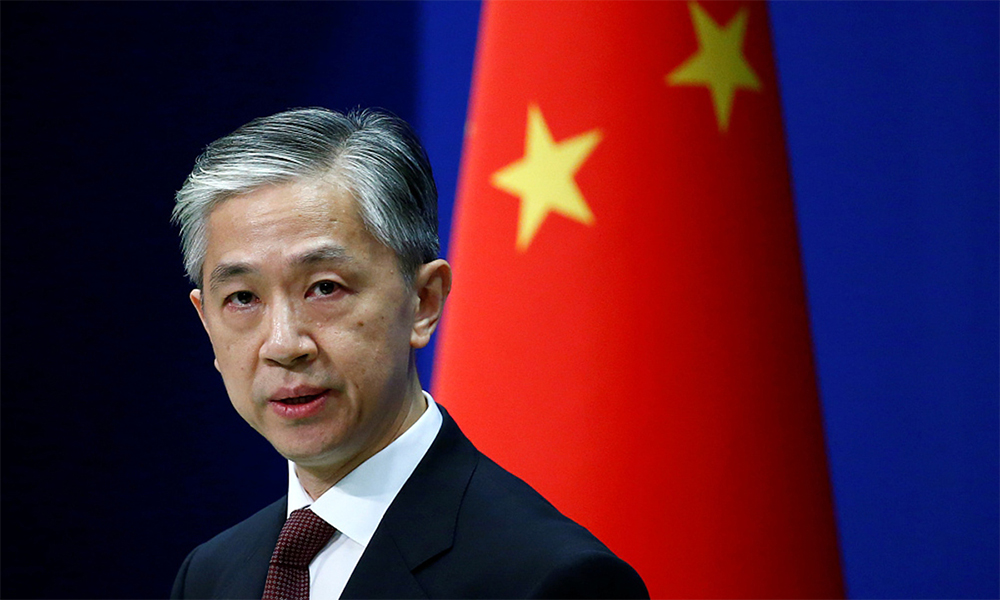Latest News
China calls on Washington to return Afghanistan’s frozen funds

China’s Foreign Ministry Spokesperson Wang Wenbin said this week that Beijing calls on the United States to immediately return Afghanistan’s central bank assets.
Addressing a press conference on Friday, Wang said in response to a US judge ruling against families of September 11 victims being given $3.5 billion from Afghanistan’s frozen funds that the US must “reflect on its action and immediately return the Afghan central bank assets.
“We have noted the reports. The US court’s ruling once again exposed the unreasonable and preposterous freezing of the assets of other countries’ central banks, an illegal act akin to banditry,” he said.
“This is Afghans’ life-saving money we are talking about, which should be used independently by Afghanistan and for the improvement of people’s livelihood and peace and reconstruction as soon as possible.
“The longer Afghanistan is rejected access to the money, the longer the US will be questioned about its morality and conscience. People will keep asking why the US stands against the Afghan people?
“We call on the US to reflect on its action and immediately return the Afghan central bank assets and remove unilateral sanctions on Afghanistan.
“It needs to credibly fulfill its primary responsibility to peace and reconstruction in Afghanistan and show the world it is capable of acting responsibly,” he said.
On Wednesday, the Islamic Emirate of Afghanistan (IEA) called on Washington to return the money after the New York federal judge ruled the families of victims in the 9/11 attacks cannot seize the funds.
The United States took control of the assets soon after the IEA gained control of the country in Afghanistan in 2021, with President Joe Biden saying the money could be made available to the families of 9/11 victims.
But Judge George Daniels of the Southern District of New York said on Tuesday the federal courts lack the jurisdiction to seize the funds from Afghanistan´s central bank.
Latest News
Continued aid to Afghanistan vital for regional security: Kazakh president

Kazakhstan’s President Kassym-Jomart Tokayev has emphasized the continuation of humanitarian assistance to Afghanistan, stating that the ongoing provision of such aid plays an important role in ensuring regional security.
Speaking at the international conference “Peace and Trust” in Ashgabat, the capital of Turkmenistan, Tokayev described addressing complex humanitarian challenges and the reconstruction of Afghanistan as a necessity.
“To ensure regional security, we consider it essential to continue providing assistance to Afghanistan, including by strengthening international efforts to address complex humanitarian issues and the reconstruction of this country. Kazakhstan remains committed to supporting the people of Afghanistan through humanitarian aid, educational projects, trade development, and food security initiatives,” he said.
Meanwhile, experts believe that sustainable improvement of the humanitarian situation in Afghanistan requires broad cooperation from the international community and support for the country’s economic development.
“Investment can be defined as one of the fundamental drivers of the economic cycle, and whenever Afghan traders do not take their money out of the country and instead invest domestically, it naturally leads to greater growth and dynamism in Afghanistan’s economy,” said Abdul Zahoor Modabber, an economic analyst.
As the humanitarian crisis in Afghanistan continues, reports by international relief organizations indicate that millions of citizens of the country are in urgent need of food, health, and livelihood assistance.
The reduction in funding for aid organizations, the impacts of climate change, and the return of migrants have increased concerns about a further deterioration of the humanitarian situation in the country.
Latest News
Islamic Emirate declines to attend Tehran meeting on Afghanistan
Latest News
Sirajuddin Haqqani: A government that intimidates its people is not a true government

Khalifa Sirajuddin Haqqani, Minister of Interior of the Islamic Emirate of Afghanistan, said during a visit to Khost province on Friday that any government which rules through fear cannot be considered a true government.
“A government is one that is loved by its people, one that serves them with respect and compassion, and from whose behavior people learn ethics and sincerity,” he said.
Haqqani also stressed that Afghans who opposed the Islamic Emirate in the past should be tolerated and treated in a way that helps eliminate hostility and animosity, paving the way for national cohesion.
-

 Sport4 days ago
Sport4 days agoILT20: Desert Vipers edge Gulf Giants in historic super over thriller
-

 Latest News2 days ago
Latest News2 days agoMuttaqi: Afghanistan’s progress requires both religious and modern education
-

 Regional4 days ago
Regional4 days agoSix Pakistani soldiers killed in TTP attack in Kurram District
-

 Business4 days ago
Business4 days agoTrade bodies warn almost 11,000 Afghan transit containers stuck at Karachi port
-

 World4 days ago
World4 days agoPowerful 7.6 earthquake hits northern Japan, tsunami warnings issued
-

 Latest News3 days ago
Latest News3 days agoTrump calls Afghanistan a ‘hellhole’ country as US expands immigration restrictions
-

 Sport5 days ago
Sport5 days agoSorkh Poshan Khafi defeats Sarsabz Yashlar 4-0 in Afghanistan Champions League
-

 Sport3 days ago
Sport3 days agoCommanding wins for Arman FC and Sarsabz Yashlar in Afghanistan Champions League

























